In today’s fast-paced financial landscape, the demand for secure, compliant, and scalable cloud services has never been higher. Whether you’re a CTO at a Fintech startup, an executive at an established financial institution, or an IT security professional focused on data protection; finding the right fintech cloud services provider is crucial.
In this article, we’ll look at the top cloud service providers for Fintech which includes the following aspects:
- Understand how these fintech cloud service providers ensure robust security measures and comply with industry regulations.
- Learn which providers offer the most scalable and flexible solutions for cloud computing to accommodate your business’s growth.
- Discover which fintech cloud services providers are at the forefront of innovation.
- Gain insights into the providers’ performance metrics and reliability records.
- Find out about the customer support quality and the SLAs offered by each provider.
- Benefit from expert analysis and recommendations to help you make an informed decision for your fintech cloud needs.
By the end of this article, you’ll have a better understanding of which cloud services for fintech align best with your specific needs and goals. So, let’s begin!
What Are Cloud Services for Fintech?
Cloud services have transformed the way businesses operate in the digital world. These services provide a range of cloud computing solutions—like storage, databases, networking, software, and analytics—delivered over the internet, also known as ‘the cloud’. This approach is centered on a pay-as-you-go model, offering flexibility and affordability.
With cloud services for fintech, businesses can:
- Avoid investing in costly hardware and infrastructure.
- Leverage flexibility and scalability to streamline operations.
- Enhance collaboration and drive innovation through shared resources.
Essentially, cloud computing allows organizations to remotely access resources and services, freeing them from the constraints of physical hardware and on-site maintenance.
Whether it’s for storing customer data, running applications, or analyzing financial transactions, cloud computing provides a cost-effective and efficient solution for businesses of all sizes, catering to a variety of operational needs.
Why Fintech Companies Should Use Cloud Services
Although a wide variety of businesses and industries benefit from using cloud services; Fintech companies, in particular, stand to benefit even more. Here’s why:
- Scalability: Fintech startups, known for their rapid growth and fluctuating demand, find an ideal solution in cloud services. These services provide scalable options that adapt effortlessly to changing business needs, allowing fintech firms to expand without the limitations of traditional infrastructure.
- Cost-efficiency: Traditional IT infrastructure requires substantial upfront investment in hardware, software, and maintenance. Cloud computing services, on the other hand, operate on a pay-as-you-go model, enabling Fintech companies to reduce capital expenses and allocate resources more efficiently.
- Did you know that 62% of financial service providers say that moving data to the cloud will reduce their total cost of ownership?
- Security and Compliance: Data security is paramount in the fintech industry. Leading fintech cloud services providers offer robust security measures, including encryption, secure internet connection, access controls, and compliance certifications, to safeguard sensitive information and ensure regulatory compliance.
- Innovation: Cloud computing empowers Fintech companies to innovate and experiment with new technologies without the burden of managing complex infrastructure. By leveraging cloud-based tools and services, organizations can accelerate time-to-market and gain a competitive edge in the rapidly evolving financial services software development landscape.
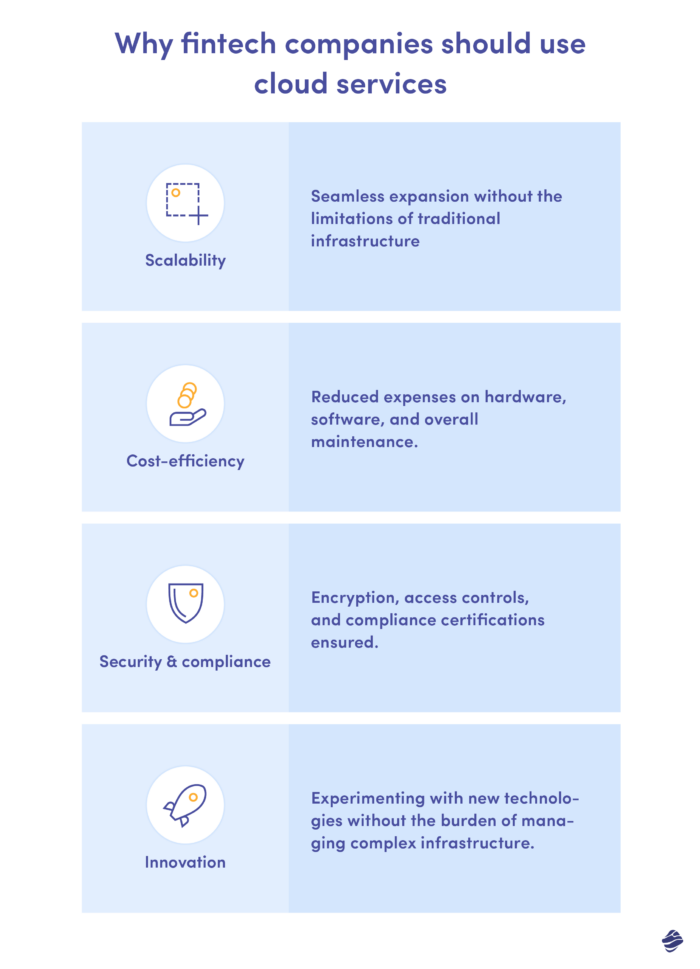
Now, let’s look at the 7 leading cloud services providers for Fintech, and explore what they offer, their pros and cons, costs, cloud technology, global data centers, and more.
The 7 Top Cloud Service Providers for Fintech
1. Miquido’s Cloud Application Services
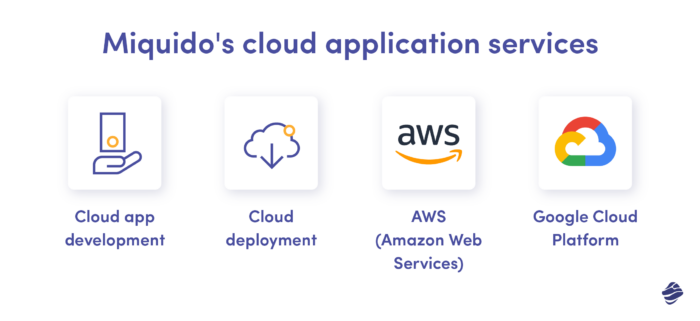
While not a “direct” fintech cloud services provider like AWS, Azure, and the other companies on this list, Miquido excels in designing, integrating, and deploying scalable, cloud-based applications, crucial for fintech companies looking to innovate and stay competitive – which is why they’re worth mentioning.
Their services extend from cloud application development to strategic migration and deployment, ensuring fintech enterprises can leverage cloud technology effectively.
Miquido’s cloud expertise encompasses:
- Custom Cloud Application Development: Tailoring solutions to meet the unique demands of fintech, from enhancing operational efficiency to securing sensitive transactions.
- Strategic Cloud Migration and Deployment: Advising on and implementing the most appropriate cloud infrastructure models (SaaS, PaaS, IaaS) for fintech needs, focusing on flexibility, scalability, and cost-efficiency.
- Certified Partnerships with AWS and Google Cloud Platform: Leveraging these platforms’ vast services to offer fintech clients robust, secure, and innovative cloud solutions, backed by Miquido’s certified expertise.
- Cost: Miquido offers competitive pricing with flexible pricing models tailored to the needs of top Fintech companies, including pay-as-you-go and subscription-based options.
- Clients: Miquido partners with fintech leaders worldwide such as AXA, BNP Paribas, Aviva, and Nextbank.
- Aviva’s partnership with Miquido for their insurance agent app streamlined sales and underscored the importance of a secure cloud services for fintech in handling sensitive data and boosting efficiency in insurance.
- BNP Paribas’ successful collaboration with Miquido for the GOmobile app by integrating features like facial recognition and providing scalable solutions highlights the vital role of a secure and efficient fintech cloud services provider, achieving over 1 million downloads.
- Miquido provided secure, scalable, and user-friendly mobile banking app development services for Nextbank, revolutionizing financial services in Southeast Asia by enabling rapid customization for banks and ensuring compliance with strict security standards.
Pros & Cons
- Pros: Customer-oriented approach, tailored solutions for the Fintech industry, expertise in integrating and deploying scalable applications, and proactive support.
- Rapid Deployment: Achieving prototypes in 2 weeks and MVPs in 3 months, demonstrating Miquido’s commitment to swift and effective solution delivery.
Notable Partnerships: Including industry giants like BNP Paribas, showcasing Miquido’s capability to develop and scale high-demand financial applications.
- Rapid Deployment: Achieving prototypes in 2 weeks and MVPs in 3 months, demonstrating Miquido’s commitment to swift and effective solution delivery.
- Cons: Limited market visibility compared to larger fintech cloud services providers, fewer third-party integrations.
Why choose Miquido as your next fintech app development company:
- Cost-Effective Solutions: Only pay for the services utilized, avoiding upfront infrastructure costs.
- Scalability and Flexibility: Easily adapt to industry changes, with scalable solutions that support dynamic fintech environments.
- Quick Implementation: Faster cloud solution deployment means more time for market strategy development.
- Reliability and Security: Minimize downtime risks and secure sensitive data, crucial for fintech operations, with Miquido’s expert application of cloud security protocols.
Best for Fintech companies seeking personalized cloud solutions, rapid deployment, and dedicated support from a trusted partner.
2. Amazon Web Services (AWS)
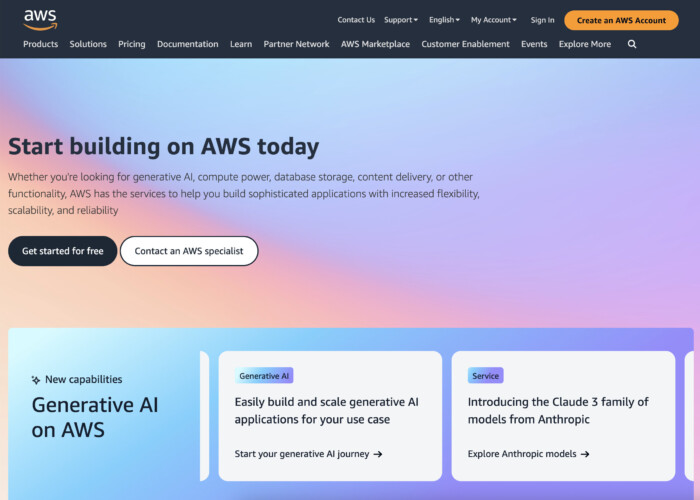
- Offerings: Amazon Web Services AWS provides a comprehensive suite of cloud computing services, including:
- Cloud computing power
- Storage
- Databases
- Machine learning
- Analytics
- Data Center Infrastructure: With data centers located in regions around the world, AWS offers high availability and low-latency services to customers.
- Locations: AWS has a global presence, with data centers in North America, Europe, Asia Pacific, and South America.
- Cost: AWS offers pay-as-you-go pricing, with costs varying depending on usage and service selection.
- Clients: Some clients include Robinhood, Coinbase, and Stripe.
- Robinhood utilized AWS’s robust scalability and security features to efficiently support their no-fee securities trading app, catering to hundreds of thousands of users at launch with minimal staff.
- Coinbase partnered with AWS to efficiently scale its bitcoin wallet and exchange service, ensuring robust security and seamless global operations, while processing massive data volumes and enabling rapid growth to over 3 million users.
- Stripe leveraged AWS’s world-class infrastructure and security best practices to scale its PCI-compliant payment platform, enhancing developer productivity and simplifying payment processing for web and mobile applications.
Pros & Cons
- Pros: Extensive range of services, robust security features, reliable performance, and advanced cloud infrastructure
- Cons: Complex pricing structure, potential for unexpected costs if not managed properly.
Key Considerations
- Security Features and Compliance:
- Robust security features: Encryption, IAM, network security controls.
- Compliance: PCI DSS, HIPAA, GDPR.
- Scalability and Flexibility:
- Auto-scaling: Amazon Web Services AWS Auto Scaling.
- Elastic Load Balancing.
- Elastic Compute Cloud (EC2).
- Amazon Aurora.
- Innovation and Ecosystem:
- AI and Machine Learning: Amazon SageMaker for scalable model development, Rekognition for image analysis, and Comprehend for natural language processing.
- Blockchain Services: Amazon Managed Blockchain simplifies blockchain network management for secure transactions.
- Ecosystem: AWS Partner Network (APN) offers specialized fintech solutions for analytics, cybersecurity, and compliance.
- Performance and Reliability:
- Uptime: AWS boasts high uptime rates and offers SLAs for continuous service availability.
- Latency: Low-latency connectivity ensures fast response times for fintech applications.
- Performance: Comprehensive monitoring tools enable real-time performance tracking and scalability.
- Customer Support and SLAs:
- Support: AWS offers 24/7 technical support via phone, email, and chat with dedicated account managers for enterprise clients.
- SLAs: AWS provides guarantees for uptime, performance, and response time, with financial compensation for downtime.
Best for Fintech companies of all sizes looking for scalable and feature-rich cloud solutions.
3. Microsoft Azure
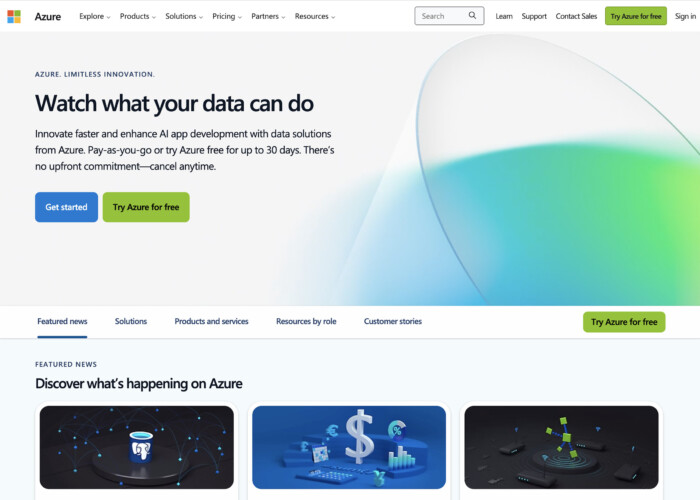
- Offerings: Azure offers a wide range of cloud services for fintech, including cloud computing, storage, networking, AI, and IoT solutions.
- Data Center Infrastructure: Azure operates data centers in over 60 regions worldwide, ensuring high availability and compliance with local regulations.
- Locations: Azure has a global footprint, with data centers strategically located to serve customers across regions.
- Cost: This fintech cloud services provider follows a pay-as-you-go pricing model, with pricing based on usage and service tiers.
- Clients: Azure counts major financial institutions like JPMorgan Chase and Bank of America among its clients.
- Bank of America embraced Microsoft Azure for its digital transformation, leveraging these cloud services for fintech to enhance business efficiency, drive digital culture change, and better meet customer needs while focusing on security and compliance.
- JP Morgan Chase leveraged Microsoft Azure to enhance its blockchain platform, Quorum, facilitating the rapid development and deployment of blockchain applications with reduced expertise requirements.
Pros & Cons
- Pros: Seamless integration with Microsoft products, strong hybrid cloud capabilities, and extensive compliance certifications.
- Cons: Learning curve for beginners, occasional service outages.
Key Considerations
- Security Features and Compliance:
- Advanced security: Threat detection, encryption, multi-factor authentication.
- Compliance: GDPR, PCI DSS, SOC 1/2/3.
- Scalability and Flexibility:
- Azure VM Scale Sets.
- Azure App Service.
- Azure SQL Database.
- Innovation and Ecosystem:
- AI and Machine Learning: Microsoft Azure Machine Learning, Computer Vision, Text Analytics for intelligent applications.
- Blockchain Services: Microsoft Azure Blockchain Service for simplified blockchain deployment.
- Ecosystem: Azure Marketplace provides a variety of fintech solutions, enhancing offerings for finance.
- Performance and Reliability:
- Uptime: Microsoft Azure maintains high uptime rates globally and offers SLAs for reliability.
- Latency: Global infrastructure minimizes latency for seamless transactions.
- Performance: Monitoring tools allow performance assessment and scalability options.
- Customer Support and SLAs:
- Support: Microsoft Azure offers round-the-clock technical support with personalized assistance and access to documentation and forums.
- SLAs: Microsoft Azure ensures uptime, performance, and response time commitments, with financial credits for disruptions.
Best for Fintech companies seeking hybrid cloud solutions and seamless integration with existing Microsoft infrastructure.
4. Google Cloud Platform (GCP)
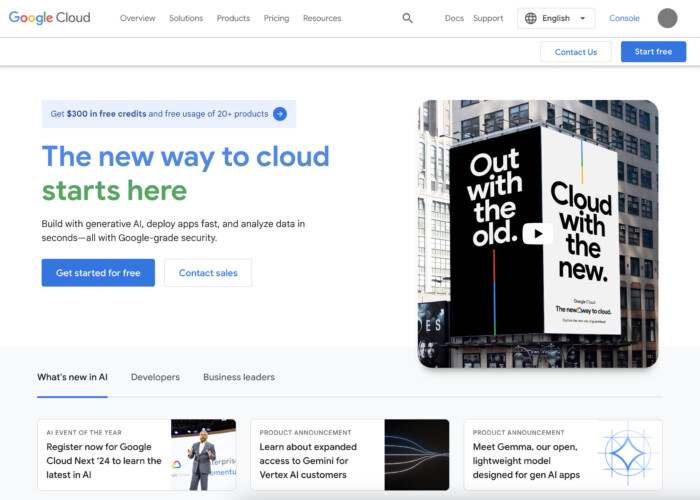
- Offerings: Google Cloud Platform offers a broad range of cloud services for fintech, including cloud computing, storage, databases, machine learning, and data analytics.
- Data Center Infrastructure: Google operates data centers in regions across the globe, ensuring low-latency access and high availability for customers.
- Locations: GCP has data centers in regions such as North America, Europe, Asia Pacific, and Latin America, with expansion plans.
- Cost: This fintech cloud services provider offers competitive pricing with pay-as-you-go and sustained-use discounts available for certain services.
- Clients: GCP counts financial services giants like PayPal and HSBC among its clients.
- PayPal worked with Google Cloud Platform to migrate its payment platform’s scalable applications, achieving significant improvements in processing speed, cost savings, and handling high transaction volumes, which enhanced its capacity to democratize online financial services.
- HSBC’s utilization of GCP highlights the significant benefits of cloud services in enhancing operational efficiency, offering scalable and advanced analytics capabilities, and ensuring data security, ultimately leading to improved customer service and innovation in the banking sector.
Pros & Cons
- Pros: Google Cloud Platform offers advanced cloud infrastructure and machine learning capabilities, strong data analytics tools, and seamless integration with Google services.
- Cons: Limited market share compared to AWS and Azure, less mature ecosystem of third-party services.
Key Considerations
- Security Features and Compliance:
- Wide range of security services: Encryption, IAM, security key management.
- Compliance: GDPR, HIPAA, SOC 1/2/3.
- Scalability and Flexibility:
- Google Compute Engine (GCE).
- Google Kubernetes Engine (GKE).
- Google Cloud SQL.
- Innovation and Ecosystem:
- AI and Machine Learning: Google Cloud AI for intelligent applications, pre-trained models for vision, speech, and language processing.
- Blockchain Services: Blockchain Hub for secure and scalable blockchain networks.
- Ecosystem: The GCP Partner Program offers fintech solutions for fraud detection, customer analytics, and payment processing.
- Performance and Reliability:
- Uptime: Google Cloud Platform ensures high uptime rates and offers SLAs for reliability.
- Latency: Global network infrastructure minimizes latency for smooth user experiences.
- Performance: Monitoring tools enable performance assessment and scalability.
- Customer Support and SLAs:
- Support: GCP provides 24/7 technical support with access to Google engineers and extensive documentation.
- SLAs: GCP guarantees uptime, performance, and response time, with service credits for non-compliance.
Best for Fintech companies looking for cutting-edge AI in fintech and machine learning capabilities, as well as robust data analytics tools.
5. IBM Cloud
- Offerings: IBM Cloud offers a comprehensive suite of cloud services for fintech, including cloud computing, storage, networking, AI, and blockchain solutions.
- Data Center Infrastructure: IBM operates data centers in regions worldwide, providing high availability and compliance with industry regulations.
- Locations: This fintech cloud services provider has data centers in regions such as North America, Europe, Asia Pacific, and Latin America, with expansion plans.
- Cost: IBM Cloud offers flexible pricing options, including pay-as-you-go and subscription-based models, with discounts available for long-term commitments.
- Clients: IBM Cloud serves a diverse range of clients, including major banks and financial institutions like BPER Banca Group and GEVA.
- BPER Banca Group, Italy’s third-largest banking group, partnered with IBM for a four-year agreement to transform into a digital business, leveraging IBM’s hybrid cloud strategy, advanced security, and AI capabilities to enhance operational efficiency, innovate services, and improve customer experience.
- GEVA Group collaborated with IBM Cloud to provide a stable, secure, and scalable cloud-based SaaS solution for financial transaction processing, leveraging IBM’s technology and reputation in the financial services industry.
Pros & Cons
- Pros: Strong focus on security and compliance, impressive cloud infrastructure, extensive experience in serving enterprise customers, and robust hybrid cloud capabilities.
- Cons: Complex pricing structure, limited availability of certain services compared to competitors.
Key Considerations
- Security Features and Compliance:
- Security emphasis: Data encryption, threat intelligence, identity governance.
- Compliance: GDPR, PCI DSS, HIPAA.
- Scalability and Flexibility:
- IBM Virtual Servers.
- IBM Kubernetes Service.
- IBM Cloud Databases.
- Innovation and Ecosystem:
- AI and Machine Learning: IBM Watson for natural language understanding, speech recognition, and predictive analytics.
- Blockchain Services: IBM Blockchain Platform for building and scaling blockchain networks.
- Ecosystem: IBM PartnerWorld offers regulatory compliance and risk management solutions for fintech.
- Performance and Reliability:
- Uptime: IBM Cloud maintains high uptime rates globally and offers SLAs for reliability.
- Latency: Low-latency connectivity ensures efficient transactions for users worldwide.
- Performance: Monitoring tools enable real-time performance assessment and scalability.
- Customer Support and SLAs:
- Support: IBM Cloud offers 24/7 technical support with direct access to experts and comprehensive documentation.
- SLAs: IBM Cloud assures uptime, performance, and response time, with compensation for service disruptions.
Best for Fintech companies with specific security and compliance requirements, as well as those seeking hybrid cloud solutions.
6. Oracle Cloud Infrastructure (OCI)
- Offerings: Oracle Cloud offers a comprehensive suite inclusive of cloud computing services, storage, databases, AI, and blockchain solutions tailored to the needs of enterprise customers.
- Data Center Infrastructure: Oracle operates data centers in regions around the world, providing high availability and low-latency access to its cloud services for fintech.
- Locations: Oracle Cloud has advanced cloud infrastructure, with data centers in regions such as North America, Europe, Asia Pacific, and the Middle East, with plans for further expansion.
- Cost: Oracle Cloud offers competitive pricing with flexible pricing options, including pay-as-you-go and subscription-based models.
- Clients: Oracle Cloud serves a diverse range of clients, including financial institutions and Fortune 500 companies like Areeba and TecBan.
- Areeba implemented Oracle Cloud Infrastructure (OCI) to enhance its digital payment solutions, leveraging OCI’s scalability, cost-effectiveness, and regional cloud regions in the Middle East for improved performance and compliance with local data regulations.
- TecBan utilized Oracle Field Service to enhance the efficiency of its field technicians by 15%, optimizing routing and job site management, which contributed to an increased service task completion rate and improved overall productivity in maintaining its ATM network across Brazil.
Pros & Cons
- Pros: Strong focus on enterprise-grade security and compliance, extensive portfolio of integrated cloud applications, and robust database offerings.
- Cons: Limited market share compared to major fintech cloud services providers, less mature ecosystem of third-party services.
Key Considerations
- Security Features and Compliance:
- Comprehensive security controls: Data encryption, identity management.
- Compliance: GDPR, PCI DSS, HIPAA.
- Scalability and Flexibility:
- Oracle Compute Instances.
- Oracle Kubernetes Engine.
- Oracle Autonomous Database.
- Innovation and Ecosystem:
- AI and Machine Learning: Oracle AI Platform, chatbots for customer service, predictive analytics in financial services.
- Blockchain Services: Oracle Blockchain Platform for secure and transparent transactions.
- Ecosystem: Oracle PartnerNetwork provides core banking and regulatory compliance solutions for fintech.
- Performance and Reliability:
- Uptime: Oracle Cloud maintains high uptime rates globally and offers SLAs for reliability.
- Latency: Low-latency connectivity ensures fast transactions for users worldwide.
- Performance: Monitoring tools allow performance assessment and scalability.
- Customer Support and SLAs:
- Support: Oracle Cloud provides round-the-clock technical support with access to specialists and documentation.
- SLAs: Oracle Cloud guarantees uptime, performance, and response time, with service credits for downtime.
Best for Fintech companies requiring strong database capabilities and integrated cloud applications, as well as those with existing Oracle infrastructure.
7. Alibaba Cloud: Cloud Computing Services
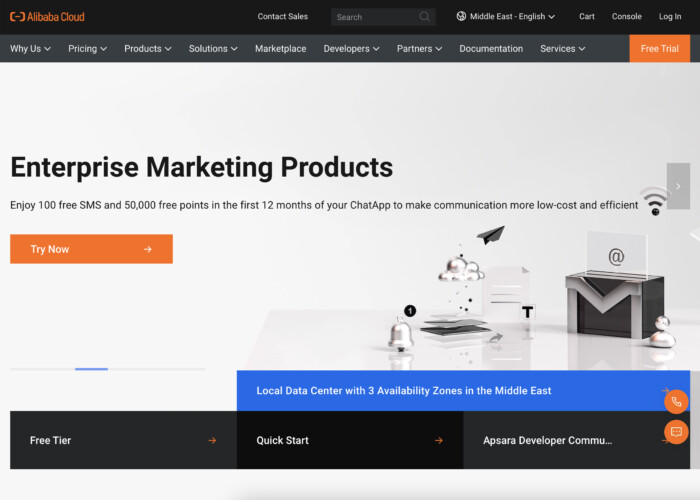
- Offerings: Alibaba Cloud offers a wide range of cloud services, including cloud computing, storage, networking, AI, and big data solutions tailored to the needs of businesses in Asia and beyond.
- Data Center Infrastructure: Alibaba Cloud operates data centers in regions across Asia, Europe, the Middle East, and the Americas, providing global coverage and compliance with local regulations.
- Locations: Alibaba Cloud has data centers in regions such as China, Southeast Asia, Europe, and the United States, with plans for further expansion.
- Cost: Alibaba Cloud offers competitive pricing with pay-as-you-go and subscription-based options, as well as discounts for long-term commitments.
- Clients: Alibaba Cloud serves a diverse range of clients, including startups, enterprises, and government organizations across Asia and beyond like Revenue Monster and LifeByte.
- Revenue Monster utilizes Alibaba Cloud to empower its FinTech as a Service and Financial Cloud solutions, enabling businesses and financial institutions to innovate and engage with customers through advanced payment, social media, and loyalty solutions.
- LifeByte leverages Alibaba Cloud’s technology to integrate global financial resources and build a fair, transparent, and reliable FinTech platform for financial professionals and institutions worldwide.
Pros & Cons
- Pros: Strong presence in the Asia-Pacific region, competitive pricing, and a growing ecosystem of third-party services.
- Cons: Limited presence outside of Asia, language, and cultural barriers for non-Chinese customers.
Key Considerations
- Security Features and Compliance:
- Robust security measures: Data encryption, access control.
- Compliance: GDPR, PCI DSS, ISO 27001.
- Scalability and Flexibility:
- Elastic Compute Service (ECS).
- Container Service for Kubernetes (ACK).
- ApsaraDB for PolarDB.
- Innovation and Ecosystem:
- AI and Machine Learning: Alibaba Cloud AI solutions for image recognition, and natural language processing.
- Blockchain Services: Alibaba Cloud Blockchain as a Service (BaaS) for simplified blockchain deployment.
- Ecosystem: Alibaba Cloud Partner Network offers digital banking and financial analytics solutions for fintech.
- Performance and Reliability:
- Uptime: Alibaba Cloud maintains high uptime rates globally and offers SLAs for reliability.
- Latency: Low-latency connectivity ensures efficient transactions for users worldwide.
- Performance: Monitoring tools enable performance assessment and scalability.
- Customer Support and SLAs:
- Support: Alibaba Cloud offers 24/7 technical support with access to specialists and forums.
- SLAs: Alibaba Cloud ensures uptime, performance, and response time, with compensation for downtime.
Best for Fintech companies operating in Asia or seeking to expand into the region, as well as those looking for cost-effective cloud solutions.
Selecting the Best Fintech Cloud Services Provider
Choosing the right fintech cloud services provider for your Fintech company is a critical decision that can impact your business’s success. Here are some tips to help you navigate the selection process and find the provider that best suits your needs:
Customization and Scalability
It’s essential to evaluate the level of customization and scalability offered by each cloud provider. For instance, if you’re a startup expecting rapid growth, look for providers who offer easy scalability without significant cost spikes.
A cloud report by Gartner predicts that by 2025, over 85% of enterprises will adopt a cloud-first principle. Therefore, choose a provider that can grow with you. Assess whether their services and cloud resources can be tailored to your company’s unique requirements. A good example is Amazon Web Services (AWS), known for its vast array of customizable services suitable for businesses of all sizes.
Size of Your Company
Your company’s size and scale are pivotal in selecting a cloud provider. Larger enterprises might need a provider like Microsoft Azure, known for its robust cloud infrastructure and advanced features suitable for complex organizational needs.
In contrast, startups might find Google Cloud Platform’s flexibility and cost-effective solutions more appealing, especially when they are in the phase of experimenting and scaling operations.
Compliance and Security Concerns
In the financial industry, security and compliance are non-negotiable. Opt for cloud services for fintech that rigorously adhere to industry regulations like GDPR and offer robust security measures. These might include advanced encryption, multi-factor authentication, access controls, and regular security audits.
For instance, IBM Cloud is renowned for its focus on security and compliance, offering dedicated financial services clouds. Also, look for fintech cloud services providers that have obtained compliance certifications like ISO 27001, which demonstrate a commitment to security standards.
Cost Considerations
Carefully evaluate the cost implications of cloud platforms’ offerings. Compare their pricing structures – whether it’s pay-as-you-go, subscription-based, or tiered pricing models.
For example, Oracle Cloud offers an appealing pay-as-you-go pricing model, which can be particularly advantageous for companies with fluctuating usage patterns. Ensure the chosen cloud platform aligns with your budget and financial objectives without compromising on essential features.
Fintech Cloud Services Provider Track Record
Researching the track record and reputation of each fintech cloud services provider is crucial. Delve into customer reviews, testimonials, and case studies to gauge the provider’s reliability, performance, and customer satisfaction levels.
Platforms like TrustRadius or G2 can provide real user reviews that offer insights into the experiences of similar fintech companies. This research can be invaluable in understanding the practical implications of partnering with a particular fintech cloud services provider.
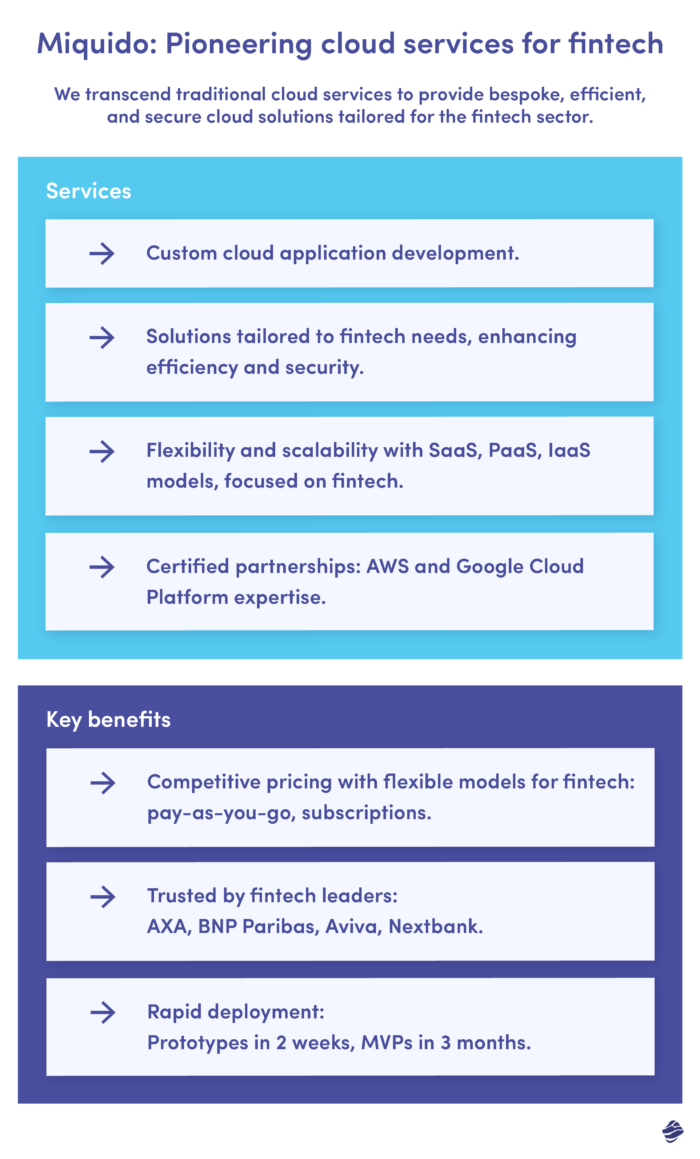
Choose the Right Fintech Cloud Services Provider
Now that you know about the leading top cloud service providers in fintech, you’re equipped with valuable insights to make an informed decision tailored to your company’s needs. Here’s a recap of the key takeaways:
- Consider customization, scalability, and compliance when choosing a fintech cloud services provider.
- Evaluate the size of your company and its specific requirements.
- Prioritize security measures and compliance certifications.
- Compare pricing structures to align with your budget and financial goals.
- Research customer reviews and track records for reliability and satisfaction.
Miquido Cloud Services ticks all the boxes, offering a comprehensive suite of features tailored to the financial industry. Our services emphasize security, compliance, and unparalleled customer satisfaction, guiding you seamlessly through the complexities of fintech cloud computing.




![[header] fintech choosing a cloud services provider](https://www.miquido.com/wp-content/uploads/2025/06/header-fintech-choosing-a-cloud-services-provider-432x288.jpg)



